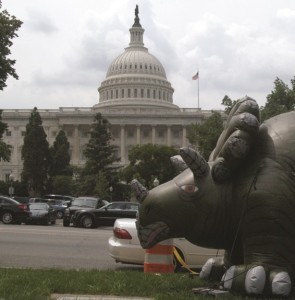 A recent National Public Radio (NPR) report looked curiously at the phenomenon of unions pushing for radical minimum wage increases (including in some cases a more-than-doubling of the current minimums). Correspondent Ben Bergman notes that few workers who make the minimum are unionized, and he asks what unions stand to gain from their campaigns.
A recent National Public Radio (NPR) report looked curiously at the phenomenon of unions pushing for radical minimum wage increases (including in some cases a more-than-doubling of the current minimums). Correspondent Ben Bergman notes that few workers who make the minimum are unionized, and he asks what unions stand to gain from their campaigns.
We can help him figure that out. For one, the Service Employees International Union (SEIU) and similar unions for service workers like the hotel and restaurant divisions of Unite HERE have plenty of bargaining units with employees under, at, or around the proposed new minimum wage level. Others have guaranteed premiums over the statutory minimum, as we have detailed previously.
Unions also have greener reasons to push massive wage hikes. The “fight for $15” worker center/minimum wage campaign is a multimillion-dollar project of SEIU, and the end goal includes paying off this “investment” with more union dues. As a result, in addition to minimum wage messaging the campaign comes with creating “Worker Organizing Committees” that file complaints with the National Labor Relations Board designed at least in part to make fast food restaurants easier to unionize. The Manhattan Institute estimated SEIU’s potential payoff from unionizing half of McDonald’s and McDonald’s franchise employees alone at $100 million per year.
And if that doesn’t work, there’s another way to turn a doubled minimum wage into more union dues. Minimum wage and so-called “living wage” laws often contain exceptions for collective bargaining agreements. Maxford Nielson of the Freedom Foundation explains:
Los Angeles became the latest to join the movement when the city council approved a law on Sept. 24 requiring large hotels to pay employees at least $15.37 per hour and provide generous paid sick-leave benefits. But the ordinance includes a provision, increasingly common in similar ordinances, that permits unions to waive the requirements in collective bargaining.
This waiver enables labor organizers to approach a nonunion employer struggling to pay the new minimum with the following offer: assist them in unionizing employees by signing a “neutrality agreement,” in return for which the union will use the collective-bargaining waiver to allow the employer to pay less than the new statutory minimum.
The only winners? The union bosses whose salaries keep flowing.



